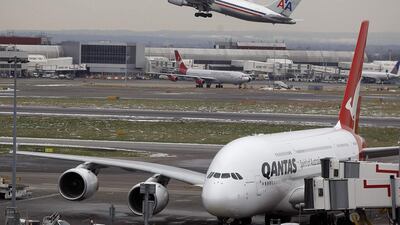London’s Heathrow airport was selected as the best option for a new runway in south-east England by a state-appointed commission, leaving a final decision on the controversial expansion with the prime minister, David Cameron.
A third Heathrow landing strip north-west of the two existing ones “presents the strongest case and offers the greatest strategic and economic benefits”, the airports commission said on Wednesday. Alternative plans to extend one of Heathrow’s runways or add one at Gatwick, south of the capital, are “credible” but have weaknesses, the report said.
Extra capacity at Heathrow, Europe’s largest air hub, would add about 40 new destinations and create 70,000 jobs by 2050, the commission said. A decision on whether to expand Heathrow now lies with Mr Cameron, whose ruling Conservative Party is split on the issue, with the London Mayor Boris Johnson among senior members who say the increased noise and pollution would affect too many people.
“The government will need to review our analysis carefully,” while at the same time moving “as quickly as it can to a decision”, the commission’s chairman Howard Davies said. “Heathrow is best-placed to provide the type of capacity that is most urgently required.”
The debate over Heathrow’s future comes after the airport last year lost its status as the top hub for international passengers, with Dubai toppling it from a position the London base had held for decades. Airports in European cities such as Paris and Frankfurt also have more runways.
Already operating close to the limits of its two strips, Heathrow has attracted 73.4 million people this year as airlines use larger jets to maximise capacity.
A third runway could be built at Heathrow for £17.6 billion (Dh101.5bn) and be completed by 2026, bolstering the British economy by £147bn over 60 years, the commission said – while firmly recommending against the construction of a fourth strip at the site.
A longer Heathrow runway would deliver a smaller increase in capacity, Davies said. A second strip at Gatwick, located in a more rural area where fewer people would be affected by the jump in aircraft movements, offers less economic benefit since growth would most likely come from short-haul European routes.
Single hubs generally have more routes, as passengers switching between planes make new destinations viable.
Mr Davies said his report was a “fundamentally different proposition” to previous studies and that it should end years of wrangling. Anti-Heathrow campaigners are already concerned that Mr Cameron, once an opponent, has come around to the plan after watering down opposition before the May 7 election.
Recommended measures for reducing the impact of a bigger Heathrow on people nearby or under aircraft flight paths include a ban on all night flights, a legally binding “noise envelope” and the creation of a fund to finance mitigation programmes such as home insulation. The study also says commitments should be made on air quality and suggests that an independent aviation noise authority be created.
business@thenational.ae
Follow The National's Business section on Twitter

